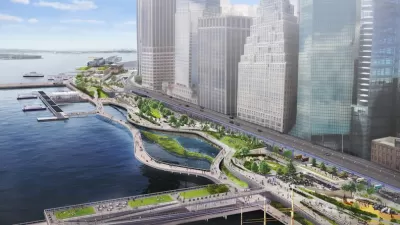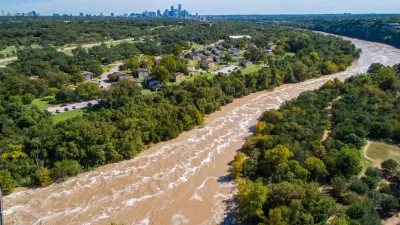The public sector and the private sector need a better system of incentives to deliver on the infrastructure and development investments necessary to prepare for climate change and other environmental threats.

"Many cities are turning to other partners to work on their resiliency efforts," according to an article by Jackie Snow. Other partners, that is, meaning the private sector.
However, much of the article focuses on the remaining disconnect between the public sector and the private sector on the work remaining to be done to build resilience—not just resilience plans. Ernst & Young and 100RC released a study called "How can cities build resilience thinking into their infrastructure projects?" for instance, "found that city governments think they understand the challenges of urban resilience better than they actually do, with only 30% of private sector agreeing that cities understand the work around urban resiliency."
The disconnect is perpetuated like challenges like term limits (politicians are interested in wins during their tenure, not in thinking on the timelines of climate change) and project budgets (private sector entities are afraid of overbidding on requests for proposals. In fact, the "study found that both the public and private sector agree there is insufficient incentives to incorporate resilience thinking into infrastructure," according to Snow.
FULL STORY: The role of P3s in resilience planning

Maui's Vacation Rental Debate Turns Ugly
Verbal attacks, misinformation campaigns and fistfights plague a high-stakes debate to convert thousands of vacation rentals into long-term housing.

Planetizen Federal Action Tracker
A weekly monitor of how Trump’s orders and actions are impacting planners and planning in America.

San Francisco Suspends Traffic Calming Amidst Record Deaths
Citing “a challenging fiscal landscape,” the city will cease the program on the heels of 42 traffic deaths, including 24 pedestrians.

Defunct Pittsburgh Power Plant to Become Residential Tower
A decommissioned steam heat plant will be redeveloped into almost 100 affordable housing units.

Trump Prompts Restructuring of Transportation Research Board in “Unprecedented Overreach”
The TRB has eliminated more than half of its committees including those focused on climate, equity, and cities.

Amtrak Rolls Out New Orleans to Alabama “Mardi Gras” Train
The new service will operate morning and evening departures between Mobile and New Orleans.
Urban Design for Planners 1: Software Tools
This six-course series explores essential urban design concepts using open source software and equips planners with the tools they need to participate fully in the urban design process.
Planning for Universal Design
Learn the tools for implementing Universal Design in planning regulations.
Heyer Gruel & Associates PA
JM Goldson LLC
Custer County Colorado
City of Camden Redevelopment Agency
City of Astoria
Transportation Research & Education Center (TREC) at Portland State University
Jefferson Parish Government
Camden Redevelopment Agency
City of Claremont





























